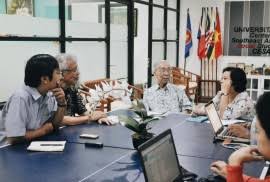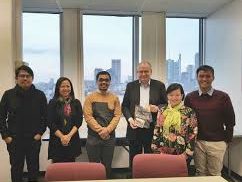As a form of cooperation between CESASS UGM with University of Freiburg, Prof. Dr. Judith Schlehe accompanied by a researcher from CESASS UGM, Vissia Ita Yulianto, shared their knowledge in the form of workshops (08/03/18). The workshop held in the Indonesian Room of CESASS UGM Library presented the topic of waste management which is still one of the problems in Indonesia. This problem is certainly very influential with the stability, including the stability of undersea ecosystems. Therefore, this study took a case study in the southern maritime area of Yogyakarta which includes part of Gunung Kidul Regency under the title “Waste, Worldview, Morality: An Inclusive Approach”.
Social science has a central position and power to understand social problems, organize the bureaucracy, organize the economy, regulate policies and public communications in support of community life both in regional and global. The problems of social imbalances, multiculturalism, religiosity, racial intolerance, marginalities, practical politics, human trafficking , regional and global power relations, migrant workers, and social aspects of disaster need clear social-humanities academics to understand and provide referrals to policy makers (quoted from Terms of Reference).
The problem is that Indonesia as a developing country still desperately needs help from experts and scientists to do development, especially in the field of physical infrastructure, the ones that are seen to be more able to give practical contribution to society. Without realizing it, the government requires development in physical form and ignores the social infrastructure. Thus, the more days pass, social science seemed increasingly disregarded. It indicates that the government has not looked further into contribution of social-humanities sciences based research.
Center for Southeast Asian Social Studies (CESASS) UGM, supported by Ministry of Research, Technology, and Higher Education, as the Center of Science and Technology in the social field must surely question the waiver of this social sciences. Thus, CESASS invited social scientists to discuss their own discipline and even cross the boundaries of their discipline to attend Series Discussion II titled “Social Sciences: Its Roles and Challenges” (13/02/2018). Prof. Sjafri Sairin & Prof. Djoko Suryo, the head of CESASS, Dr. Phil Hermin Indah Wahyuni, along with other researchers from CESASS namely Muhadi Sugiono, M.A., Dr. Phil. Vissia Ita Yulianto, Putu Yogi Paramitha, M.H., Fatkurrohman, M.Si, and two students of the doctoral program of Department of Public Policy and Management UGM discussed the social science roles and challenges in this era.
The word ‘transgender’ may be familiar to our ears. This word meant in this article means people who have gender identity or gender expression that is different from the gender they had at birth, from woman to man, or vice versa.
Southeast Asia is one area where religion is the most considered factor, so transgender is often considered to be against the norm. Not infrequently in Southeast Asia, transgender gets discriminated, especially to enjoy a decent life. In fact, they are often forcibly evicted, fired, and so on. In fact, transgender is a human being and a citizen who has human rights. In addition, it must always be remembered that the state is obliged to provide protection to its citizens, without exception. Thus, we need to highlight this transgender phenomenon.
Centre for Southeast Asian Social Studies (CESASS) UGM got a visit from New Zealand again. This time, the two guests were Khairiah A. Rahman, M.A. from the School of Communications Studies, Auckland University of Technology and Dr. Adam Brown from Auckland Institute of Studies. Their visit to CESASS UGM Office was to share knowledge related to international journal writing. The event was packed in a workshop titled “Communicating and Publishing in International Academic Forum”.
The barrier of language differences is one of the issues that Indonesian academics often encounter when they will write English-language articles in accordance with international rules. Looking at the phenomenon, CESASS UGM tried to bridge the difficulties by holding a brief workshop on writing and publishing international scientific articles. The workshop which took place on Thursday, December 28, 2017 was held at Ruang Indonesia, CESASS UGM Library.
Nationalism is an endless thing. It must be inherited continuously through education, slogans, and of course the existence of ‘others’. In the context of inter-state relations the existence of ‘others’ will become more complicated if the national identity of other nations has come into contact in open conflict. In other words, ‘others’ would be considered an antagonist if history presents a collective memory of inter-state conflicts.
In Southeast Asia, conflicts between nations are not new. The confrontation between Malaysia and Indonesia at the end of the Old Order is one example. However, since the establishment of ASEAN 50 years ago, open conflicts between Southeast Asian nations incorporated in ASEAN have almost never been heard. This is because the countries incorporated in ASEAN agree not to interfere with the sovereignty of other countries in politics or ideology. With the agreement they hope to create peace in the region of Southeast Asia.
After working hard from August to November to realize the World Class Professor (WCP)Program of Ministry of Research, Technology, and Higher Education, Center for Southeast Asian Social Studies (CESASS) UGM, Center for Coastal Rehabilitation and Disaster Mitigation Studies (CoREM) of Universitas Diponegoro, and Tsunami Disaster Mitigation Research Center (TDMRC) of Universitas Syiah Kuala held a research seminar themed “Ecological Communication on Maritime Disaster Management in Southeast Asia” at the Faculty of Engineering, Universitas Mataram (15/12/2017).
Pasung is the traditional practice of dealing with people with psychological disorders, or those perceived as such. It consists of binding people, often with chains, and locking them in small rooms, cages or sheds. It can last anywhere from a few hours up to many years. Although it was banned in Indonesia in 1977, it is practiced to this day, especially in rural areas.
I must admit that when I heard about pasung for the first time I was quite shocked. It was the cruelty and callousness of people that struck me most. However, the documentary film Breaking the Chains, released in 2015, made me look at the issue from a wider perspective. Its creators did not focus on how brutal people who condemn their loved ones to such fate are, but rather showed how complex their situation is, that is how many elements affect the decision to take such a step.
One effort to develop the capacity and performance of an institution is to build cooperation with other institutions. This is also done by the Centre for Southeast Asian Social Studies (CESASS) UGM which started the cooperation with the Department of Southeast Asian Studies, Goethe Universität Frankfurt am Main (7/12/2017). Head of CESASS, Dr.phil. Hermin Indah Wahyuni accompanied by researcher of CESASS, Dr. Agus Suwignyo, Dr. phil. Vissia Ita Yulianto, Andi Awaluddin Fitrah, M.A., Aditya Indra Nugraha, S.Ant, and Fitri Handayani, S.I.P. met the Head of Department of Southeast Asian Studies of Goethe Universität Frankfurt am Main, Prof. Dr. Arndt Graf.
As a form of reciprocity towards the process of exchanging knowledge and joint publication, the research team of Centre for Southeast Asian Social Studies (CESASS) Universitas Gadjah Mada visited Germany from the 25th November 2017 till the 8th December 2017. The visit was a response visit, as 2 German professors had initially made a visit, Prof. Thomas Hanitzsch (Ludwig-Maximilians-Universitӓt Müchen) and Prof. Judith Schlehe (Albert-Ludwigs University of Freiburg), whom were the visiting professors for the World Class Professor (WCP) program by Kemenristekdikti.
In the 12th Jogja-Netpac Asian Film Festival 2017, JAFF collaborated with Centre for Southeast Asian Social Studies (CESASS) Universitas Gadjah Mada to present the “Public Lecture” program. This year’s Public Lecture was special as it included research poster presentations regarding cinemas in Asia which was organized by CESASS UGM. The results, 9 presenters were chosen from Indonesia, Malaysia and the Philippines that took part in the event.
This Public Lecture program was conducted from the 4th till the 6th of December 2017, at the 2nd Floor Seminar Room in the UGM’s main library. Consisted of six sessions spread throughout the three-days event, which comprised of the; seminar, discussion, book launching, and research poster presentations. The themes discussed within the forum is in line with this year’s theme “Fluidity” taking the example of “Film and Art Performance”, “Indonesian Film Audience”, “Asia Pacific in the Digital World”, “Distribution and Film Funding”, “ASEAN Identity in the Short Films”, and discussion about the book of Film, Ideology and Military written by Budi Irwanto and Cultural Specificity in Indonesian Film: Unity in Diversity written by David Hanan










